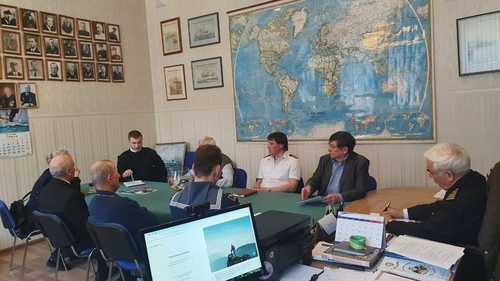ÐÎÑÑÈÉÑÊÈÉ ÏÐÎÔÅÑÑÈÎÍÀËÜÍÛÉ ÑÎÞÇ ÌÎÐßÊÎÂ
SEAFARERS' UNION OF RUSSIA
A NON-UNIONIZED SEAFARER
IS AN UNPROTECTED SEAFARER
Back
FEASM discussed current issues in maritime education in Russia

A decrease in the general level of competence, a lack of contemporary learning and teaching aids, a low level of Maritime English, a few young lecturers in institutes - these and other issues were discussed at the Far Eastern Association of Shipmasters. During the meeting the participants sought solutions to the identified problems and formed a strategy for the development of maritime education in the country.
Among those attending the meeting were Petr Osichansky, FEASM President and Chairman of the SUR Primary Organization of Vladivostok, and the members of latter – serving captains, pilots, lecturers of maritime specialties, Nikita Vitvitsky, Chairman of the SUR craft organization at Admiral Nevelskoy Maritime State University.
As Petr Osichansky noted, the general level of competence is currently deteriorating, both for young specialists and those who have been working at sea for a long time.
In many respects, the reason for this is the reduction in regulatory requirements for knowledge assessment. Today its main tool is testing, which anyone can successfully pass if he practice on the Delta program and visually remember the correct answers. Besides, young seafarers lack practical training, and additional training programs for management level specialists do not fill existing knowledge gaps as they are short-term. Moreover, proposals from specialists when discussing draft regulations of the Ministry of Transport and Rosmorrechflot are not accepted.
In addition, Nikita Vitvitsky said that today cadets lack contemporary learning and teaching aids for seagoing specialties that would meet up-to-date requirements and provide additional practical skills.
For example, at present there is an urgent need to update the training for Electrical Officers, because advanced ship equipment requires up-to-date knowledge.
As for Maritime English its teaching methods has not been updated for a long time, and the cadets themselves note that they would like more hours to study the subject. “In English, as in sports, you need constant training and practice, otherwise there will be no any progress,” one of the meeting participants emphasized. Due to the lack of a proper level of training, young seafarers know Maritime English worse than specialists who have been working in the shipping for ten years.
The shortage of new generation of lecturers worsens the situation. Besides, as Nikita Vitvitsky says, the cadets would like to get knowledge from yesterday's Chief Officers, Captains, Chief Engineers having the relevant experience.
However, nowadays young specialists are reluctant to go to graduate school, and institutes fail to attract new teaching staff despite their efforts. The main stumbling block in this matter is wages – the salaries of seagoing staff are often much more then those at maritime institutes.
Note that FEASM is located on the territory of Admiral Nevelskoy Maritime State University, which makes it possible to maintain a close relationship between the university and the association. Cooperation began in the early 2000s: since that moment the University Administration and FEASM have repeatedly highlighted the importance of collaboration, thanks to which it is possible to achieve solutions to many contemporary issues.
Up
